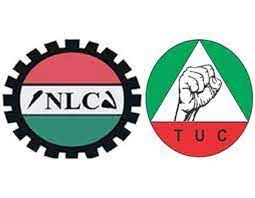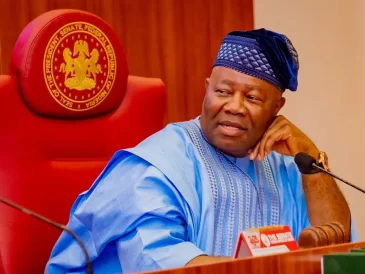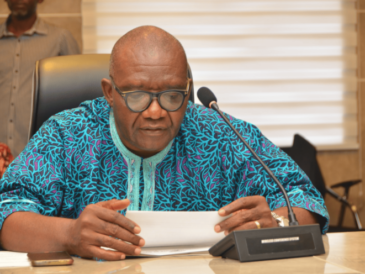By Tajudeen Atitebi
Lagos, May 3, 2024 – In spite of all entreaties, the organised labour has commenced its indefinite nationwide strike on Monday after the breakdown of negotiations on the new national minimum wage on Friday.
The NLC and the TUC had held a press conference in Abuja on Friday immediately after the last meeting of the National Minimum Wage Committee to announce their decision to go on strike from Monday.
The unions said the strike was also to force government to reverse the recent hike of electricity tariff to N66/kwh from N225/kwh for Band A customers.
According to the committee, the failure of the negotiations was due to labour’s insistence on N494,000 living wage, while the federal government had offered N60,000 as minimum wage
Lateef Fagbemi, the Minister of Justice and Attorney-General of the Federation, has described the labour’s strike as premature, ineffectual and illegal in view of the haste with which it was planned and executed.
He said the strike was premature at a time when the federal government and other stakeholders involved in the tripartite committee on new national minimum wage had not declared an end to negotiation.
In a letter to the unions, the minister wrote: “You are aware that the federal and state governments are not the only employers to be bound by a new national minimum wage, hence, it is vital to balance the interest and capacity of all employers of labour in the country (inclusive of Organized Private Sector), in order to determine a minimum wage for the generality of the working population”.
The minister drew labour’s attention to its failure to give the mandatory strike notice of a minimum of 15 days before embarking on strike as required by the law.
Some experts on labour matters have condemned labour for the haste in calling workers out on strike.
Bayo Adeleye, a trade unionist in Lagos, said while the unions had good reasons to go on strike, the speed of its execution was suspicious.
He agreed with the minister of justice that the unions ought to have served the federal government the mandatory 15-day notice before the commencement of the strike.
“It is unfortunate and regrettable that the labour unions failed to give the mandatory 15-day notice, and this has rendered the strike illegal,” he said.
Festus Osifo, President of the TUC, said the haste in calling the strike was labour’s way of getting back at the federal government for its unseriousness during the minimum wage negotiations.
Osifo said based on the mandate given to the leadership of the organised labour by their organs, there was nothing else to do other than to declare an indefinite strike to bring government to order.
“If you could remember we had a National Executive Council meeting of the NLC as well as the TUC where we were further charged that the leadership to take charge and take all actions to call government to order at the expiration of the ultimatum,” he said.
Osifo once told journalists during the minimum wage deliberations that the federal government had not shown any seriousness on the negotiations.
He alleged that the Federal Government’s team was barely visible during the negotiations.
“Today’s meeting further demonstrated the unseriousness and apparent contempt with which the Nigerian state holds the demands of Nigerian workers and people.
“No governor was present and ministers were absent except the minister of state for labour and employment who doubles as a conciliator.
“There was none of those present on the side of the government with appropriate authority to commit them to any outcome; in essence, government abandoned the meeting.
“We consider this disdainful and lack of commitment to a successful national minimum wage negotiation exercise,”
The truth is that there is no longer any trust between the labour and federal government since the federal failed to meet nearly all its promises to labour on provision of palliatives immediately after the removal of petrol subsidy.
Although, the federal government is yet to defend itself on labour’s allegation of its unseriousness during the negotiations, but some discerning Nigerians recall that the federal had in May announced between 25 to 35 percent increase in salaries of its workers which it may make do for now.
The federal government, has in turn, blamed the trade unions for making unreasonably high demand of N494,000 living wage.
Mohammed Idris, the Minister of Information and National Orientation, said the N494,000 living wage labour demanded by labour would amount to N9.5 trillion in annual wage bills, an amount which is capable of destabilising the economy and jeopardising the welfare of over 200 million Nigerians.
The minister said the offer of N60,000 minimum wage by the Federal Government had already been accepted by the organised private sector.
While accepting the N60,000 offered by the federal government, the private sector operators also questioned the rationale behind labour’s demand for N497,000 living wage for workers.
Oyerinde Adewale-Smatt, the Director-General of the Nigerian Employers Consultative Association (NECA), said that contrary to some views, the minimum wage committee was set up to negotiate a new national minimum wage and not a living wage.
He expressed bewilderment on how labour came about the idea of a living wage, saying “minimum wage is the wage that no employer should pay below, either in the private or public sector.”
He said the N494,000 living wage demanded by labour would kill any business and this was contrary to the position of the organised private sector.
Adewale-Smatt said the position of the association was to arrest the ongoing job losses and continuous shut-down of businesses in Nigeria.
“It is important to state that jobs can only be guaranteed when businesses are alive and sustainable,” he said.
Adewale-Smatt said that aside from paying salaries, businesses were facing a myriad of other challenges like multiple taxes, levies and fees, astronomical power costs and rising interest rates and exchange rates.
“An astronomical increase as being demanded by labour will make compliance practically impossible. We urge government to fast-track the implementation of its interventions to make life more bearable for workers, businesses, and Nigerians in general.
“Any disruption of organised business activities could have serious consequences on job security and the sustainability of the businesses,” Adewale-Smatt said.
He said it would be unreasonable for any government to fix minimum wages that many employers would refuse to pay. (GBN)





